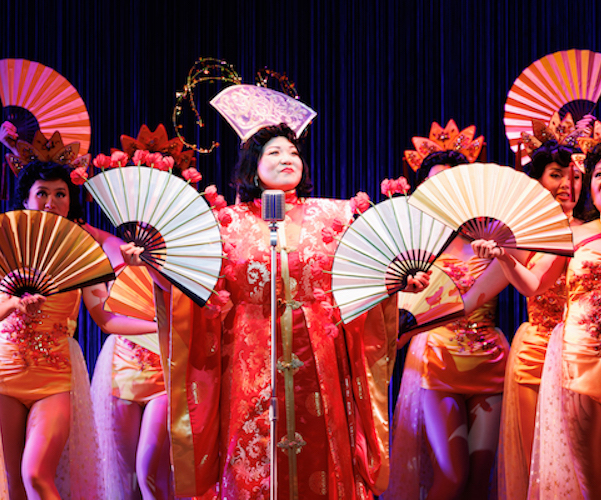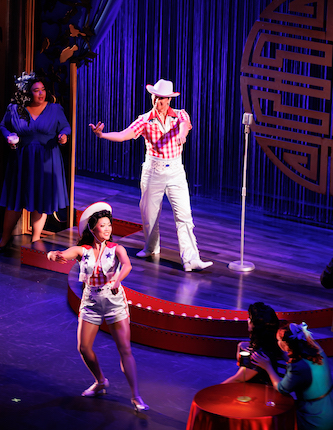Opera Review: Boston Lyric Opera’s “Madama Butterfly” — A Problematic Update
By Aaron Keebaugh
The Boston Lyric Opera’s production was a reminder that Puccini’s score is sure to stand the test of time, even when valiant attempts to make the opera’s storyline more palatable fall short.
Madama Butterfly. Music by Giacomo Puccini. Libretto by Luigi Illica and Giuseppe Giacosa Directed by Phil Chan. Staged by Boston Lyric Opera at the Emerson Colonial Theatre through September 24.

Butterfly, played by Karen Chia-Ling Ho (center), is a nightclub entertainer in the Boston Lyric Opera’s production of Madama Butterfly. Photo: Ken Yotsukura
The popular conceit has always held that the classics are timeless, able to rise above the din of politics of any given age. But for Phil Chan, a stage director and activist, beloved operas are durable because they can be reinterpreted to reflect our present times and values.
That vision has dictated the approach of Chan’s new production of Puccini’s Madama Butterfly. But one major takeaway from this staging is that new and politically sensitive revisions, while well-intentioned, can still leave vital interpretive matters unresolved.
This significantly retooled Butterfly grew out of “The Butterfly Process,” a three-year initiative headed by Chan that reexamined Puccini’s renowned score through the current lens of diversity and inclusion. The effort was kicked off after the BLO postponed what would have been a more traditional production of the opera in 2020 after outcry that Puccini’s depictions of kimono-clad geishas — Japanese characters restricted to stereotypes — read as culturally insensitive given the rising violence against Asians because of the Covid pandemic.

Nightclub dancers (Azamat Asangul, onstage and Cassie Wang) entertain patrons in Boston Lyric Opera’s production of Madama Butterfly. Photo: Ken Yotsukura
This wasn’t the first time that Butterfly drew public ire. During the Second World War, American opera houses routinely shelved performances of the opera for the opposite reason: protagonist Cio-Cio San, the victim of American soldier B. F. Pinkerton’s betrayal, was too sympathetic. Even then, artistic leaders maintained the opera’s universal value, an notion symbolized — ironically, suggests historian Jonathan Rosenberg — via performances of the opera in Japanese American incarceration camps during the war.
Chan’s production brings this perceptual history full circle. Set in San Francisco in the ’40s, the story centers around Butterfly (Cio-Cio San), a Japanese American nightclub performer who, along with her fellow immigrants, are eventually incarcerated in an Arizona camp for the remainder of the war. Her marriage to Pinkerton is initially engineered as a farce, though she and her betrothed go far beyond mere infatuation with each other.
Butterfly anxiously awaits her husband’s return from the war while tending to their son, who, in a fitting, Puccini-inspired twist, falls ill with tuberculosis. Then Pinkerton returns — with his new American wife — promising to give the child a better life. Butterfly sorrowfully acquiesces to this idea, only to watch the child die from the malady. Dramatized through pantomime, we see Butterfly surviving into old age, still consumed by grief over the loss.
Passages of the turn-of-the 2oth-century libretto haven’t been tweaked cosmetically to reflect Chan’s intriguing changes. The catch is the confusion the comes along when elements in the original story don’t match the revisions. For example, why, if the marriage between Butterfly and Pinkerton is performative, would Sharpless (per the original), warn Pinkerton about the dangers of going through with it? Other alterations were similarly puzzling. The incarcerated Goro’s insistence that Butterfly marry Signor Dori — who has been remade from a Japanese patron into a rich Italian American from Chicago — rings discordantly for this character.
Most disturbing: Butterfly’s unyielding insistence on her faith in American promise and salvation. Locked up behind barbed wire and watched over by an armed guard, she sings of her unbending faith. She comes off as delusional rather than hopeful. Crucially missing, particularly in this day and age, was any sense that her incarceration was traumatic, that it engendered an enduring memory of pain and ostracism that was common to many Japanese Americans who survived the experience.
As if to make up for puzzling omission, photos of real-life families who had to endure the tragedy were displayed over the stage by way of a dream sequence. Perhaps this was meant as an earnest act of commemoration. But, for me, it just felt like heavy-handed compensation for the fact that Butterfly refused to see her situation for what it was. One need not pander to a traditional reading of the drama to find that this kind of updating relays a mixed message.

During a visit from Officer Sharpless (Troy Cook, r.) Butterfly (Karen Chia-Ling Ho, center) reveals a secret in the Boston Lyric Opera’s production of Madama Butterfly. Photo: Ken Yotsukura
The production’s fine singing, however, went some way in smoothing over these dramatic inconsistencies. As Butterfly, Karen Chia-Ling Ho sang with deep feeling and gorgeous tone, her agile soprano tinged with the right amount of darkness. Her voice soared in “Un bel dì, vedremo,” Butterfly’s bright-eyed vision that when Pinkerton returned life would blossom afresh. Ho had an equal partner in Dominick Chenes, who made the role of Pinkerton more sympathetic than in traditional portrayals. His beaming tenor complemented Ho in the Act 1 love duet. And, by opera’s end, Chenes’s voice took on raw emotional heft as Pinkerton, rife with guilt, exclaims that he is a coward.
As Sharpless, Troy Cook was swallowed up by the orchestra in the opening act. But his performance strengthened as the drama unfolded, his oaken baritone in its finest form in the act 3 trio. Rodell Rosel asserted a clarion presence as the scheming Goro. Hyungjin Son was palpably menacing as Uncle Bonze, who angrily disowned Butterfly because he believed she had abandoned her people. Matthew Arnold boldly projected the assured swagger of Signor Dori, and Vera Savage sang vibrantly in the brief role of Kate Pinkerton.
Yu Shibagaki’s vivid sets transformed the Colonial’s space into a posh nightclub, glittery cityscape, and dreary incarceration camp, and Chan’s taut stage directions reveled in the emotional energy of the libretto and music.
Conductor David Angus led the orchestra with generous sweep and rubato — every bar of the score struck home. The BLO’s production was a reminder that Puccini’s score is sure to stand the test of time, even when valiant attempts to make the opera’s storyline more palatable fall short.
Aaron Keebaugh has been a classical music critic in Boston since 2012. His work has been featured in the Musical Times, Corymbus, Boston Classical Review, Early Music America, and BBC Radio 3. A musicologist, he teaches at North Shore Community College in both Danvers and Lynn.
Tagged: Boston-Lyric-Opera, David Angus, Madama Butterfly, Phil Chan

Thank you for being willing to recognize that when updates twist and contort the actual plot and the characters to fit a view that has nothing to do with the opera at hand, no matter how au courant the treatment is the artform is not done no favors. But I do have to ask, why was no reason was given for eliminating the character of Suzuki, given that she is not mentioned either in the plot details or in the otherwise complete comments about all of the singers.